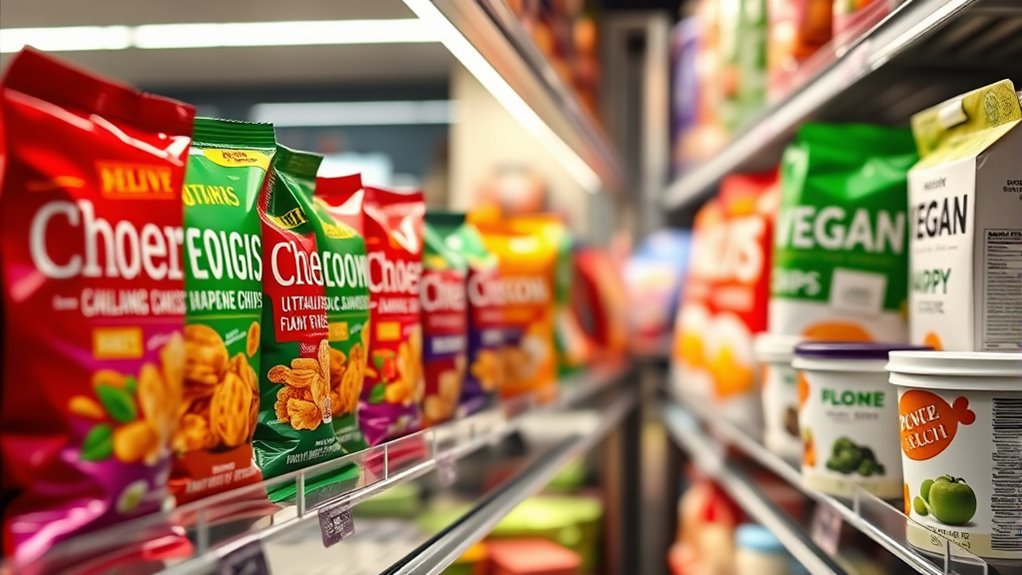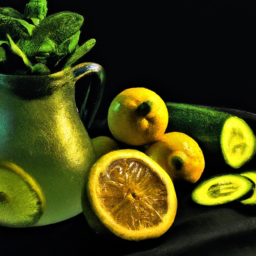To navigate ultra-processed vegan foods, focus on recognizing common ingredients like preservatives, artificial flavors, and refined plant proteins. Opt for snacks with simple, whole-food ingredients like nuts, fruits, or minimally processed plant-based products. Always check labels for added sugars, artificial additives, or long ingredient lists. By choosing more plant-based whole foods and being mindful of labels, you support your health and wellness. Stay with us to explore practical tips for making smarter, healthier vegan choices.
Key Takeaways
- Prioritize whole, minimally processed plant foods like fruits, vegetables, nuts, and grains over ultra-processed vegan products.
- Read labels carefully to avoid added sugars, artificial ingredients, preservatives, and chemical additives.
- Choose products with simple, recognizable ingredients and transparent labeling for healthier vegan options.
- Limit consumption of processed vegan meats and cheeses; use them sparingly as flavor enhancers rather than primary sources.
- Incorporate homemade snacks and desserts with natural ingredients to reduce reliance on ultra-processed vegan convenience foods.
Understanding What Makes Vegan Foods Ultra-Processed
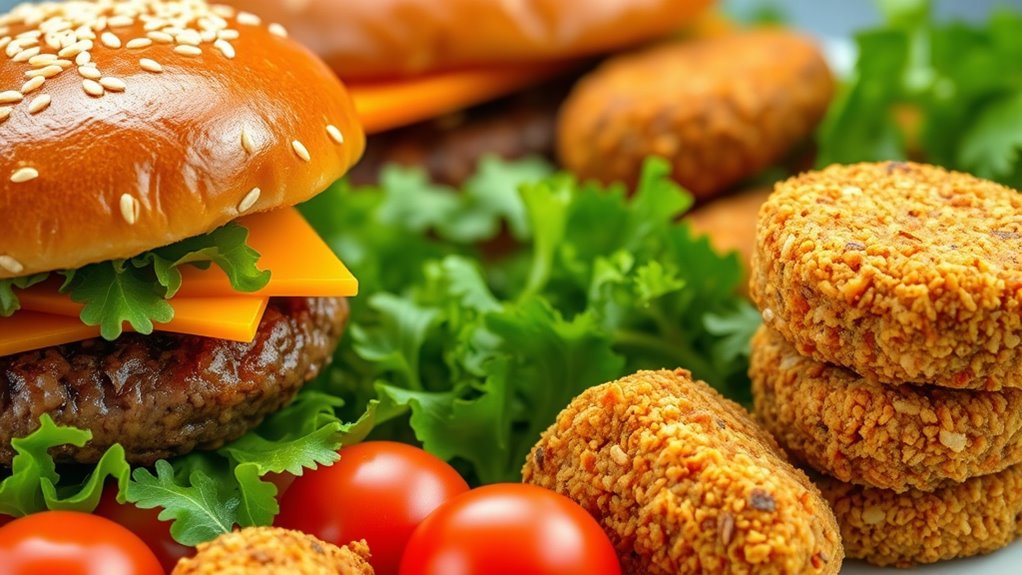
Understanding what makes vegan foods ultra-processed starts with recognizing how these products are created. Many rely on vegan protein sources, such as textured soy or pea protein, which are heavily processed to improve texture and nutritional profile. Manufacturers often add artificial ingredients to enhance flavor and mimic traditional meat or dairy tastes. Plant-based flavors are commonly used to make these products more appealing, but they can be synthetic or heavily refined. These processes involve extracting, refining, and combining ingredients to produce a consistent, shelf-stable product. While some vegan foods are minimally processed, ultra-processed options often contain numerous additives, preservatives, and flavor enhancers that substantially alter the original ingredients. Recognizing these processing steps helps you better understand what’s in your vegan foods. Additionally, processing methods can significantly impact the nutritional quality of these products. The extensive use of additives and preservatives is a hallmark of ultra-processed vegan foods, often making them less healthy than whole, minimally processed plant-based options. Furthermore, the incorporation of technology in manufacturing allows for mass production but can sometimes compromise the nutritional integrity of the final product. Being aware of these cybersecurity vulnerabilities in manufacturing systems underscores the importance of transparency and safety in food production.
Common Ingredients in Ultra-Processed Vegan Products
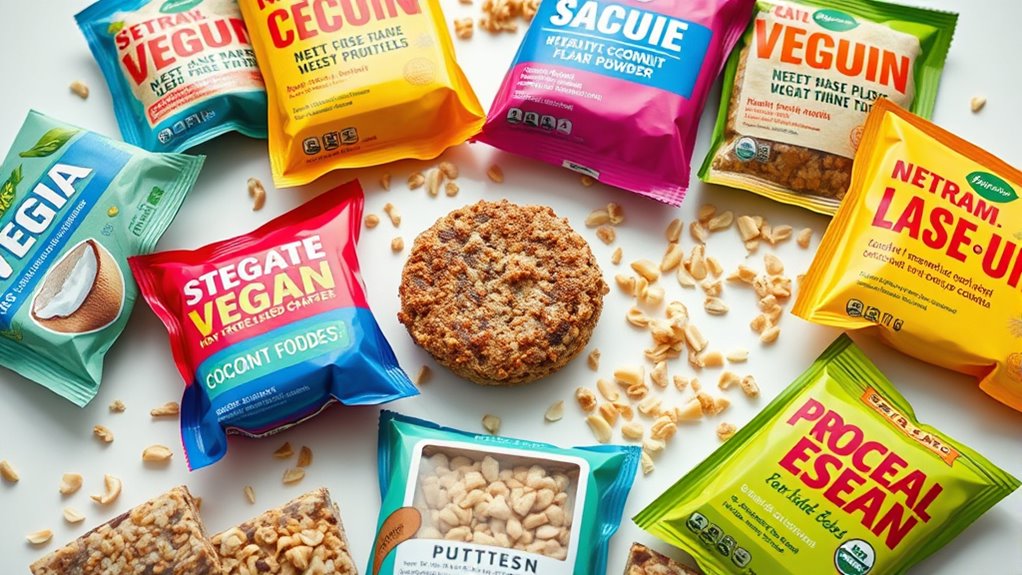
Many ultra-processed vegan products contain a variety of common ingredients designed to enhance texture, flavor, and shelf life. These often include ingredient additives that mimic meat or dairy, making products more appealing. You’ll also find packaging materials that preserve freshness and extend shelf life, but sometimes at the cost of added chemicals. Understanding these common ingredients helps you make more informed choices about what you’re consuming. Being aware of secure payment processing can also guide consumers to support brands that prioritize transparency and safety in their product sourcing and labeling. Additionally, many of these products utilize wicks or wax substitutes to improve their sensory qualities and shelf stability, which may involve the use of performance cookies to analyze product performance and consumer feedback. Recognizing common additives can help you identify potential allergens or unwanted chemicals in vegan processed foods, and staying informed about food additive regulations can further support healthier choices.
Recognizing Healthier Vegan Snack Options

While ultra-processed vegan products often rely on additives and artificial ingredients, choosing healthier snack options means looking for foods that prioritize natural ingredients and minimal processing. Focus on snacks with simple, recognizable components, like nuts, seeds, or dried fruits. Many vegan snack trends emphasize plant-based packaging, reducing environmental impact and supporting sustainability. To identify better options, check for snacks that are minimally processed and avoid excessive preservatives. Look for brands that highlight whole foods and transparent ingredient lists. Additionally, selecting snacks that are minimally processed can help you avoid unnecessary additives and artificial flavors. These choices often come in eco-friendly packaging, aligning with eco-conscious values. Being aware of self watering plant pots and their features can inspire sustainable choices in food packaging and storage. Incorporating natural preservation methods, such as vacuum sealing or dehydration, can also help extend freshness without relying on artificial preservatives. Using sustainable packaging options ensures that your snack choices support environmental conservation efforts. By selecting snacks that follow these principles, you can enjoy tasty, nourishing treats without compromising your health or the planet. Refrigeration and storage can help preserve the freshness of natural snacks.
Reading Labels for Nutritional Value and Additives

Reading labels carefully is essential to making informed choices about vegan snacks, especially when it comes to their nutritional value and additives. Your label reading skills can reveal hidden sugars, unhealthy fats, or excessive sodium that may undermine your health goals. To boost your additive awareness, look beyond the front packaging and scrutinize the ingredients list. Here are four key points to keep in mind:
- Check for added sugars and artificial sweeteners
- Identify preservatives and artificial colors
- Note the amount of protein, fiber, and essential nutrients
- Be cautious of unfamiliar, chemical-sounding ingredients like additives. Being aware of these components can also help you recognize potential links between additives and health issues discussed in astrology and attractiveness, which influence perceptions of well-being. Paying attention to label transparency can further empower your food choices and support your overall health. A thorough review of paint sprayer accessories can also help ensure you select the right tools for your projects.
The Impact of Ultra-Processed Foods on Overall Wellness

Understanding what’s on your food labels helps you make better choices, but it’s equally important to contemplate how ultra-processed vegan foods impact your overall wellness. These foods often rely on flavor enhancement and texture modification to appeal to your taste buds, yet they can also contain additives that may affect your health. Consuming too many ultra-processed options might lead to weight gain, energy crashes, or nutrient imbalances. They can disrupt digestion and reduce intake of whole, nutrient-dense foods. To help you navigate this, here’s a quick comparison:
| Aspect | Ultra-Processed Vegan Foods |
|---|---|
| Flavor enhancement | Increases appeal but may mask real flavor |
| Texture modification | Improves mouthfeel but can reduce fiber content |
| Overall impact | Risks overload of additives, less nutrition |
Being aware of food processing levels can further guide you in making healthier choices. Recognizing the types of additives used can help you assess the healthfulness of these products.
Balancing Convenience With Whole Food Choices

Finding the right balance between convenience and whole food choices is essential for maintaining a healthy vegan diet. Relying solely on ultra-processed options can lead to missing vital nutrients and feeling less energized. To find harmony:
- Choose whole foods like fresh vegetables and grains over processed vegan cheese whenever possible.
- Savor plant-based desserts made from natural ingredients instead of highly processed snacks.
- Use vegan cheese as a flavor enhancer rather than your main protein source.
- Prepare quick, wholesome meals that combine convenience with nutrients, keeping your energy steady.
Tips for Incorporating Less Processed Vegan Foods Into Your Diet

Incorporating less processed vegan foods into your diet can be straightforward with simple strategies. Start by swapping out ultra-processed snacks for whole-food alternatives like fresh fruits, vegetables, or nuts. When choosing vegan desserts, opt for homemade options using natural ingredients instead of store-bought, heavily processed varieties. Incorporate plant-based supplements, such as hemp or pea protein, to boost nutrition without relying on highly processed products. Focus on preparing meals from scratch using minimally processed ingredients, which allows you to control added sugars and preservatives. Meal planning helps ensure you include more whole foods and reduces temptation to reach for ultra-processed options. With these small changes, you’ll enjoy a more nutritious, balanced vegan diet that’s less reliant on highly processed foods.
The Role of Plant-Based Whole Foods in a Healthy Lifestyle
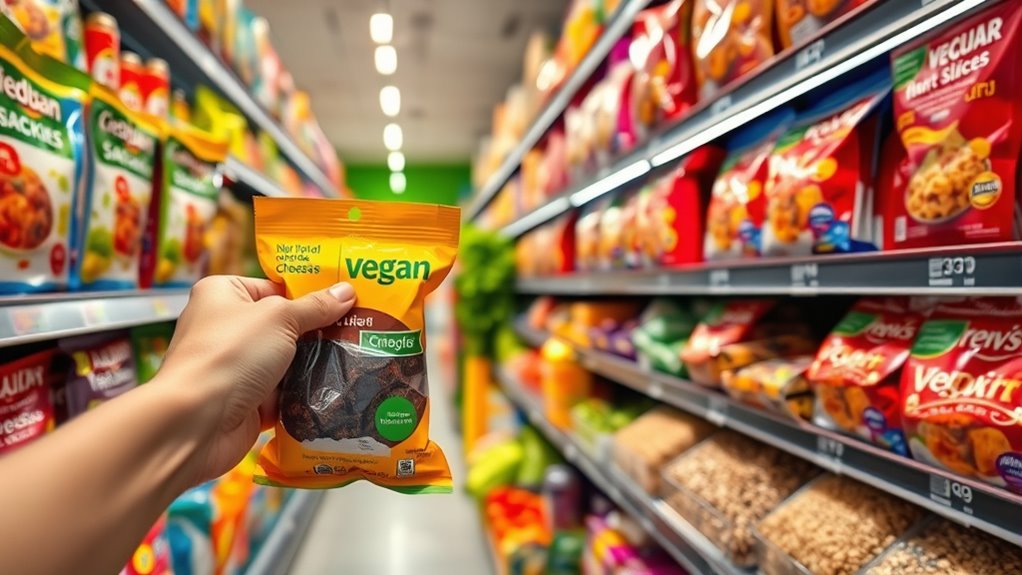
Plant-based whole foods are packed with essential nutrients that support your health. Choosing these foods helps you minimize processed intake and get the most nutritional value. Incorporating more of them into your diet can markedly boost your overall well-being.
Nutrient Density Benefits
Have you ever wondered why whole plant-based foods are considered crucial for a healthy diet? Their nutrient density offers incredible benefits that go beyond basic nutrition. By choosing whole foods, you nourish your body with indispensable vitamins, minerals, and antioxidants. These nutrients support your immune system, boost energy, and promote longevity. Plus, whole foods allow you to enjoy natural flavor enhancement and texture modification, making meals more satisfying without added processed ingredients.
Here are four reasons to prioritize whole plant-based foods:
- Rich in essential nutrients that support overall health
- Promote sustained energy levels
- Help manage weight naturally
- Enhance meal enjoyment through superior flavor and texture
Embracing these foods empowers you to thrive and enjoy a vibrant, balanced lifestyle.
Minimizing Processed Intake
While processed foods can be tempting for convenience, choosing whole plant-based foods is essential for minimizing intake of added sugars, unhealthy fats, and artificial additives. Prioritize fresh fruits, vegetables, grains, and legumes to support your health goals. These foods serve as excellent snack alternatives and are perfect for meal prep, helping you avoid ultra-processed options. Here’s a quick guide:
| Whole Foods | Benefits | Tips |
|---|---|---|
| Fresh Fruits | Natural sweetness | Use as snacks or toppings |
| Leafy Greens | Nutrient-rich | Incorporate into salads |
| Whole Grains | Fiber boost | Prepare in advance for meals |
Switching to minimally processed plant foods keeps your diet wholesome and sustainable, making healthy choices easier every day.
Making Informed Decisions at the Grocery Store
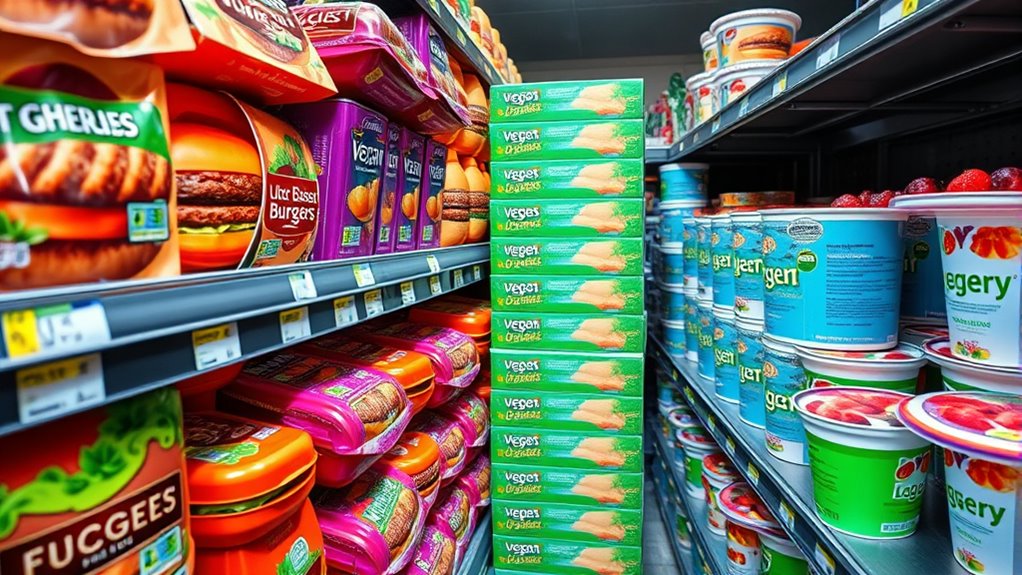
When you’re at the grocery store, reading ingredient labels helps you spot added sugars and artificial ingredients. Recognize additive names to avoid ultra-processed foods that may harm your health. Prioritize choosing whole, minimally processed foods to support your vegan lifestyle.
Reading Ingredient Labels
Ever wondered how to quickly spot unhealthy ingredients on a food label? Here’s how to become a savvy shopper.
- Check ingredient sourcing—prefer items with recognizable, whole-food ingredients rather than mysterious additives.
- Scan for long lists—a shorter list often means less processed, more natural ingredients.
- Notice packaging considerations—beware of labels with excessive plastic or misleading claims that mask ingredient quality.
- Be alert to hidden fillers—ingredients like starches or oils can hide behind vague terms, signaling ultra-processing.
Reading labels carefully helps you avoid ultra-processed vegan foods that rely heavily on additives and questionable sourcing. It empowers you to choose products with better ingredient sourcing and packaging considerations, supporting your health and ethical values.
Recognizing Additive Names
Recognizing additive names is essential for making informed choices at the grocery store, especially when shopping for vegan products. Clear labeling helps you identify ingredients quickly, but additives often have complex or unfamiliar names. Developing additive awareness enables you to spot preservatives, stabilizers, flavor enhancers, and artificial colors that may not align with your vegan or health goals. Look for common additive terms like E-numbers or chemical names, and research unfamiliar ones to understand their purpose. By paying close attention to ingredient lists and understanding additive names, you can avoid products with unwanted additives, ensuring your choices support your vegan lifestyle and health. Improving labeling clarity awareness empowers you to make smarter, more conscious decisions every time you shop.
Choosing Whole Foods
Choosing whole foods over highly processed vegan options allows you to maximize nutrient intake and minimize exposure to artificial additives. By selecting fresh fruits, vegetables, grains, and legumes, you gain essential vitamins and minerals while reducing reliance on vegan cheese and plant-based desserts loaded with preservatives.
Consider these steps:
- Scan labels carefully, avoid products with long ingredient lists or unfamiliar additives.
- Opt for whole, unprocessed produce instead of pre-packaged vegan snacks.
- Choose natural alternatives like nuts or seeds over processed vegan cheese.
- Savor homemade plant-based desserts made with whole ingredients, not artificial sweeteners.
Making these choices empowers you to enjoy nutritious, satisfying meals without sacrificing flavor or health.
Developing a Sustainable Approach to Vegan Eating
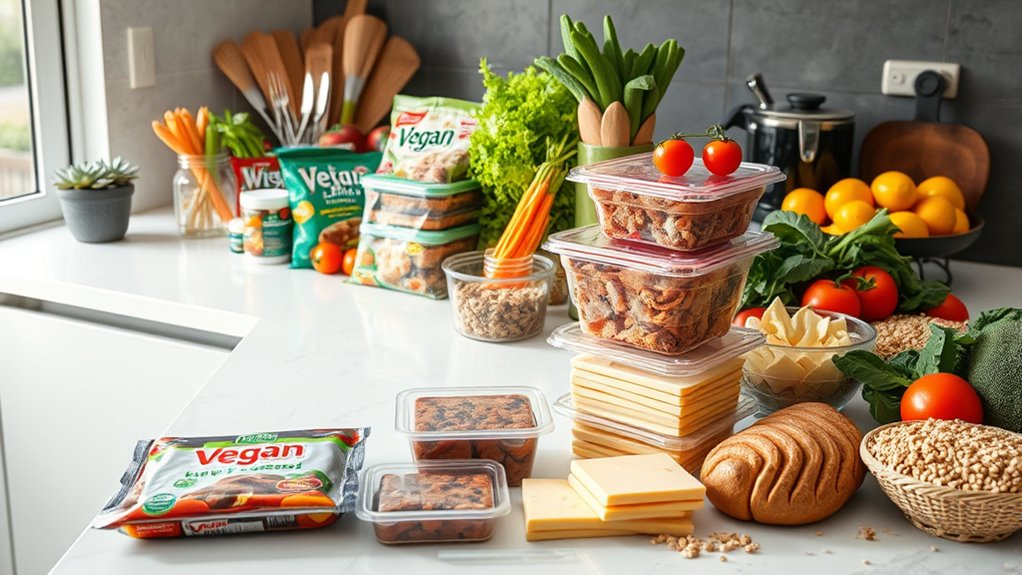
To develop a sustainable approach to vegan eating, you need to prioritize whole, minimally processed foods that support both your health and the environment. Planning your meals ahead through effective meal prep helps reduce waste and reliance on ultra-processed options. Focus on mastering culinary techniques like roasting, steaming, and sautéing to bring out natural flavors and textures, making plant-based dishes more appealing. Incorporate seasonal vegetables, grains, and legumes into your diet, which are both eco-friendly and nutritious. By cooking from scratch, you gain control over ingredients, avoiding hidden preservatives and additives. This approach encourages mindful eating, minimizes waste, and supports sustainable practices, ensuring your vegan journey benefits your well-being and the planet.
Frequently Asked Questions
How Do Ultra-Processed Vegan Foods Affect Environmental Sustainability?
Ultra-processed vegan foods can impact environmental sustainability by increasing environmental footprint and resource utilization. You might not realize that producing these foods often requires more energy, water, and packaging than whole, plant-based options. As a result, they may contribute to higher greenhouse gas emissions and resource depletion. By choosing less processed plant foods, you can reduce your ecological impact, supporting a more sustainable lifestyle and helping protect the environment.
Can Ultra-Processed Vegan Foods Cause Allergies or Sensitivities?
You might wonder if ultra-processed vegan foods can cause allergies or sensitivities. They often contain food additives, which can trigger reactions in sensitive individuals. It’s important to check allergen labeling carefully, as these products may include common allergens or hidden ingredients. If you’re prone to food sensitivities, choose whole, minimally processed options whenever possible, and consult labels to avoid ingredients that could cause adverse reactions.
Are There Specific Brands Known for Minimally Processed Vegan Options?
You can find minimally processed vegan options by looking for brands that prioritize transparency and clear ingredient sourcing. Brands like *Amy’s Kitchen* and *Dr. Praeger’s* often disclose their sourcing and avoid unnecessary additives. Always check labels for ingredient lists and certifications. Supporting companies dedicated to transparency helps you choose products with fewer ultra-processed ingredients, making it easier to enjoy vegan foods without concerns about excessive processing or hidden additives.
How Do Ultra-Processed Vegan Foods Impact Long-Term Athletic Performance?
Ultra-processed vegan foods can negatively affect your long-term athletic performance by impairing nutrient absorption and gut health. These foods often contain additives and preservatives that disrupt digestion, making it harder for your body to absorb essential nutrients. Over time, this can lead to decreased energy levels, slower recovery, and reduced strength. To maintain peak performance, focus on whole, minimally processed foods that support gut health and nutrient absorption.
What Are the Economic Considerations of Choosing Ultra-Processed Versus Whole Vegan Foods?
When choosing between ultra-processed and whole vegan foods, you should consider the cost comparison and market accessibility. Ultra-processed options often cost less and are easier to find, making them convenient for budget-conscious shoppers. However, whole vegan foods may be pricier but offer better nutritional value. Weigh these economic factors to make informed decisions that suit your budget and access to fresh, minimally processed foods.
Conclusion
Finding your way through the world of vegan foods is like tending a garden—you need to choose your plants wisely to ensure a healthy harvest. By understanding ingredients, reading labels, and prioritizing whole foods, you can cultivate a balanced diet that nourishes your body and supports your values. Remember, each mindful choice is a seed planted for long-term wellness, helping you grow a vibrant, sustainable lifestyle rooted in nourishment rather than processed shortcuts.
